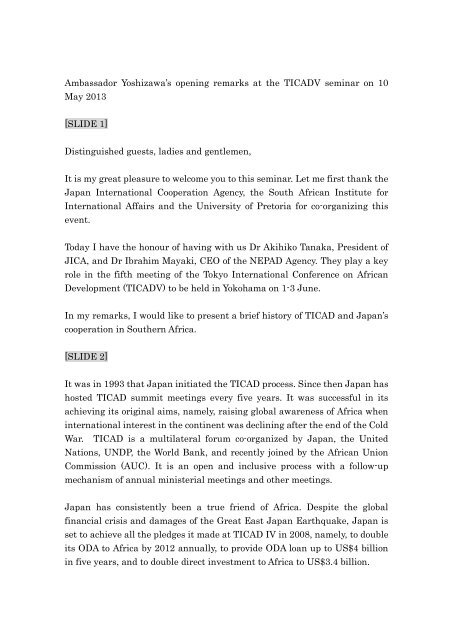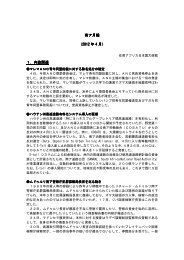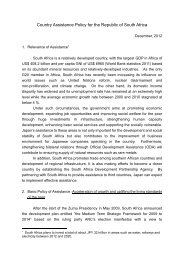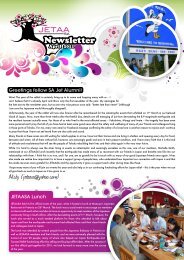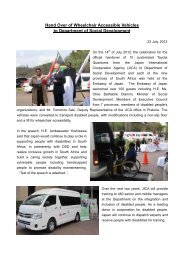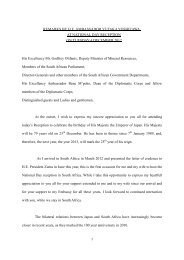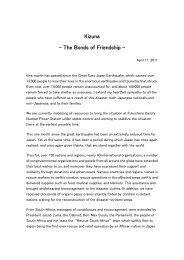Opening remarks by Yutaka Yoshizawa, ambassador of ... - JICA
Opening remarks by Yutaka Yoshizawa, ambassador of ... - JICA
Opening remarks by Yutaka Yoshizawa, ambassador of ... - JICA
- No tags were found...
You also want an ePaper? Increase the reach of your titles
YUMPU automatically turns print PDFs into web optimized ePapers that Google loves.
Ambassador <strong>Yoshizawa</strong>’s opening <strong>remarks</strong> at the TICADV seminar on 10<br />
May 2013<br />
[SLIDE 1]<br />
Distinguished guests, ladies and gentlemen,<br />
It is my great pleasure to welcome you to this seminar. Let me first thank the<br />
Japan International Cooperation Agency, the South African Institute for<br />
International Affairs and the University <strong>of</strong> Pretoria for co-organizing this<br />
event.<br />
Today I have the honour <strong>of</strong> having with us Dr Akihiko Tanaka, President <strong>of</strong><br />
<strong>JICA</strong>, and Dr Ibrahim Mayaki, CEO <strong>of</strong> the NEPAD Agency. They play a key<br />
role in the fifth meeting <strong>of</strong> the Tokyo International Conference on African<br />
Development (TICADV) to be held in Yokohama on 1-3 June.<br />
In my <strong>remarks</strong>, I would like to present a brief history <strong>of</strong> TICAD and Japan’s<br />
cooperation in Southern Africa.<br />
[SLIDE 2]<br />
It was in 1993 that Japan initiated the TICAD process. Since then Japan has<br />
hosted TICAD summit meetings every five years. It was successful in its<br />
achieving its original aims, namely, raising global awareness <strong>of</strong> Africa when<br />
international interest in the continent was declining after the end <strong>of</strong> the Cold<br />
War. TICAD is a multilateral forum co-organized <strong>by</strong> Japan, the United<br />
Nations, UNDP, the World Bank, and recently joined <strong>by</strong> the African Union<br />
Commission (AUC). It is an open and inclusive process with a follow-up<br />
mechanism <strong>of</strong> annual ministerial meetings and other meetings.<br />
Japan has consistently been a true friend <strong>of</strong> Africa. Despite the global<br />
financial crisis and damages <strong>of</strong> the Great East Japan Earthquake, Japan is<br />
set to achieve all the pledges it made at TICAD IV in 2008, namely, to double<br />
its ODA to Africa <strong>by</strong> 2012 annually, to provide ODA loan up to US$4 billion<br />
in five years, and to double direct investment to Africa to US$3.4 billion.
TICAD has contributed in promoting a particular set <strong>of</strong> development policies .<br />
From the outset it has been instrumental in promoting the twin principle <strong>of</strong><br />
“ownership” <strong>by</strong> the African countries and “partnership” between African and<br />
developed countries. It has also emphasized private sector development,<br />
human capacity development and infrastructure to achieve economic growth.<br />
It has promoted the concept <strong>of</strong> “human security” and South-South<br />
cooperation. It is no coincidence that these are policies which Japan also<br />
attaches importance.<br />
TICAD attaches importance to peace and stability as the foundations <strong>of</strong><br />
development. As the consolidation <strong>of</strong> peace requires seamless and<br />
continuous support to make it irreversible, Japan’s assistance covers<br />
conflict prevention, humanitarian assistance, reconstruction assistance,<br />
restoration and maintenance <strong>of</strong> security, and promotion <strong>of</strong> good governance.<br />
During the TICAD V Ministerial Preparatory Meeting held in Addis Ababa<br />
on March 16-17, Mr. Fumio Kishida, Japanese Minister for Foreign Affairs,<br />
announced Japan’s additional commitment to provide assistance in these<br />
areas to the amount <strong>of</strong> about US$550 million. Included in this package is<br />
US$120 million for humanitarian assistance, support in the areas <strong>of</strong><br />
security and governance in the Sub-Saharan region, as well as emergency<br />
grant aid <strong>of</strong> US$ 6 million extended to the UN trust fund for AFISMA<br />
(African-led International Support Mission to Mali). Japan’s other<br />
contributions include the dispatch <strong>of</strong> Japan Self Defence Force to UNMISS<br />
(United Nations Mission to South Sudan) and the deployment <strong>of</strong><br />
Maritime-Self Defense Force for Anti-Piracy Operations <strong>of</strong>f the coast <strong>of</strong><br />
Somalia and in the Gulf <strong>of</strong> Aden.<br />
[SLIDE 3]<br />
As for TICADV, the basic theme that has emanated from discussions with<br />
the African countries is to improve the “quality <strong>of</strong> growth”. That is to say,<br />
work towards economic growth that is transformative, resilient and inclusive<br />
so that benefits can be more widely, equitably and sustainably shared. It is<br />
quite fitting that this is the main theme <strong>of</strong> TICADV since Africa is now<br />
beginning to follow a path towards rapid growth. To achieve quality growth,
more investments in such areas as education, health, infrastructure and<br />
agriculture are required. At TICADV, the Yokohama Action Plan is expected<br />
to feature concrete actions in all these areas.<br />
[SLIDE 4]<br />
At TICADV, <strong>JICA</strong> plans to announce several regional initiatives in the<br />
Southern African region. Very importantly, <strong>JICA</strong> is partnering with South<br />
Africa to provide support to other countries in the region. Let me explain.<br />
One feature <strong>of</strong> Japan’s approach in education is the emphasis on providing<br />
human resources to meet the needs <strong>of</strong> its industries. <strong>JICA</strong>’s new initiative in<br />
Southern Africa will build upon the existing cooperation with the<br />
Department <strong>of</strong> Higher Education <strong>of</strong> South Africa, namely, to set up a regional<br />
training centre at Tshwane University <strong>of</strong> Technology to train graduates to<br />
improve their employability for businesses. Among others, it will promote<br />
KAIZEN, which is a bottom-up quality and productivity improvement<br />
movement started in Japan, using input from Japanese companies based in<br />
South Africa. The project will contribute in supplying skilled labour to the<br />
industries.<br />
[SLIDE 5]<br />
Second, Japan is the largest bilateral donor in infrastructure in Africa,<br />
providing assistance <strong>of</strong> 41.6 billion yen (equivalent to about 4.16 billion<br />
rands) in 2008-2011 for transport, energy, and water. Japan works closely<br />
with NEPAD in this regard. To promote industrialization and employment,<br />
<strong>JICA</strong> is completing a study on economic corridor development. The study will<br />
identify potential locations for development <strong>of</strong> industrial zones and logistics<br />
along the main corridors in Southern Africa. The North-South Corridor is a<br />
candidate for follow-up activities. There is a potential for Japan to cooperate<br />
with South Africa in this regard.<br />
[SLIDE 6]<br />
Third, <strong>JICA</strong> is working to raise the capacity <strong>of</strong> development finance
institutions (DFIs) in Southern Africa in cooperation with the Development<br />
Bank <strong>of</strong> Southern Africa (DBSA). In the future, this project has the potential<br />
to enable funding from Japan and elsewhere to be channeled through the<br />
DFIs for regional development.<br />
[SLIDE 7]<br />
In terms <strong>of</strong> Japan-South Africa economic relations, in 2012 Japan was South<br />
Africa’s third largest export destination and the fifth largest source <strong>of</strong><br />
imports. Japanese direct investment to South Africa has been steadily<br />
increasing in recent years, amounting to nearly 20 billion rands (stock) in<br />
2010. Japanese companies generate about 150,000 jobs in the country. What<br />
is more, companies such as Toyota and Nissan contribute significantly to<br />
raising the capacity <strong>of</strong> local industries. Japanese companies are also involved<br />
in mining beneficiation. With the biennial Japan-South Africa Business<br />
Forum planned to take place during TICADV, it will be an important<br />
occasion to further promote Japanese business activities in South Africa.<br />
President Zuma is expected to attend TICADV along with other leaders from<br />
the continent. We hope that the visit will contribute to further enhancing the<br />
already close cooperation between the two countries.


